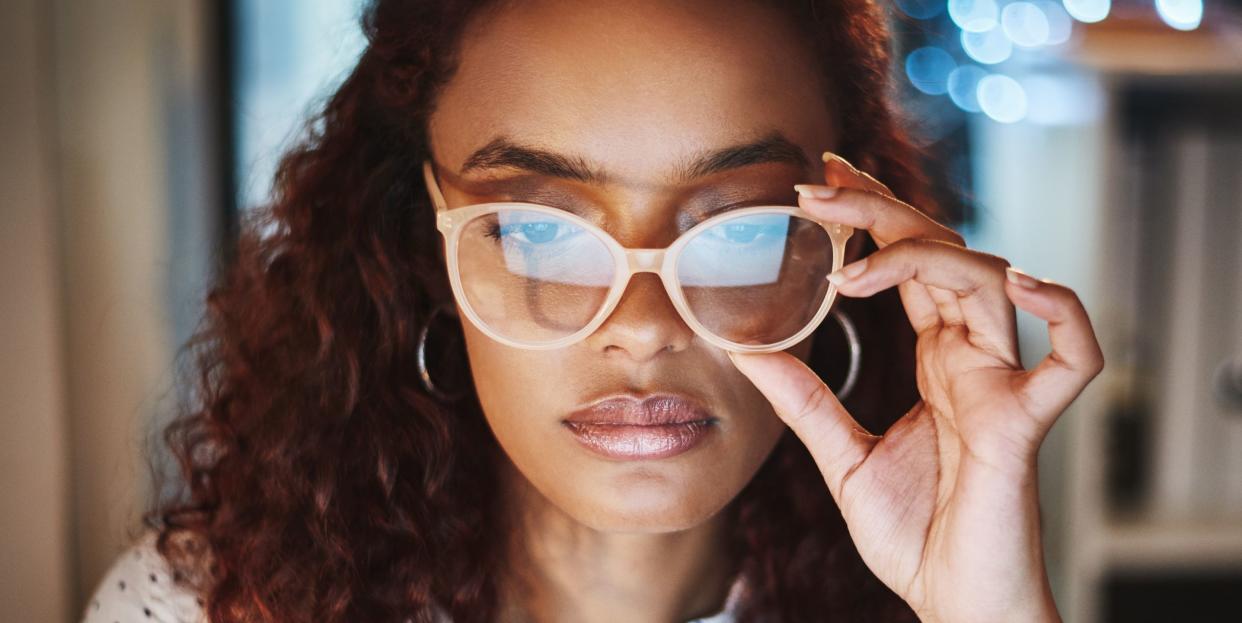These Stylish Blue Light-Blocking Glasses May Have A Surprising Sleep Benefit

Current relationship status: in a domestic partnership with my iPad, laptop, and iPhone. After shifting all areas of my life to digital (virtual happy hours, endless IGTV workouts), my screen time has skyrocketed—and wreaked havoc on my eyes. By the end of the day, they are dry and tired.
Enter blue light–blocking glasses. The trendy specs are typically marketed as the antidote to the purported ill effects (red eyes, blurred vision, headaches, and more) of blue light, and as protection from the blue wavelengths that are absorbed by the eyes.
But I had to wonder: Are the glasses actually helping—and is blue light as detrimental as they say? Short answer(s): maybe, and shockingly, no. Before you add a pair to your cart, let’s peep the facts.
First: What exactly is blue light?
While people often associate blue light with phone screens, it can also come from fluorescent light, LED light, and even sunlight, according to the American Academy of Ophthalmology.
Blue light in particular has been linked to sleep issues, by delaying the release of melatonin (a sleep-inducing hormone), and disrupting the body's circadian rhythm, according to a 2015 study in the journal Proceedings of the National Academy of Sciences.
Sellers of blue-light blocking glasses also claim blue light is linked to permanent eye damage, like vision loss, though there's no solid evidence of that yet, per the AAO. (UV light, however, has been shown to increase the risk of eye diseases like cataracts and cancer.)
Is blue light damaging to the eyeballs?
No, it's not.
Surprise: Your eyes can defend themselves from the glow. Because blue light is such a short wavelength, outer portions of the eye simply absorb much of the light, and protect key internal parts of the eyeball, says Eve J. Higginbotham, MD, a professor of ophthalmology at the University of Pennsylvania’s Perelman School of Medicine.
What’s more, the idea that blue light in general (and particularly the kind from all your screens) causes eye damage hasn’t been proven in scientific studies, says Purnima Patel, MD, clinical spokesperson for the American Academy of Ophthalmology. Well, that’s a relief.
Then, do blue light-blocking glasses work to protect against eye strain?
Nope.
Blue light isn’t the culprit of eye fatigue (yep, just a rumor), but the strain is real and simply comes from staring at a screen for hours, blinking less, and focusing at close range. It’s like your eye muscles are holding a biceps curl for hours on end, Dr. Patel says.
The way to release that tension and allow the eye muscles to relax is by taking a short tech break. Docs recommend following the 20/20/20 rule: “Every 20 minutes, make sure you’re looking at least 20 feet away for 20 seconds,” says Angela Elam, MD, an assistant professor of ophthalmology at the University of Michigan Kellogg Eye Center. Essentially, “give your eyes a rest.” Still dry after that? Apply OTC moisturizing artificial tears.
Are there *any* benefits to blue light-blocking glasses?
Yes!
The accessory may come in handy in the evening hours, as there is one thing blue light-blocking glasses might be able to do: help you sleep. That’s because blue light has been shown to slow release of the sleepy hormone melatonin. In fact, wearing blue-blocking glasses boosted sleep quality for participants in a recent study from the University of Houston.
“Blue light alters the body’s circadian rhythm, which is our wake-and-sleep cycle,” says Dr. Patel. “During the day, blue light is supposed to wake us up, but exposure at night can make us have some difficulty getting to sleep.” Pop on a pair when you notice the sun dipping on the horizon, or three to four hours before snooze time (or, even better, get off your devices before bedtime!).
You Might Also Like

